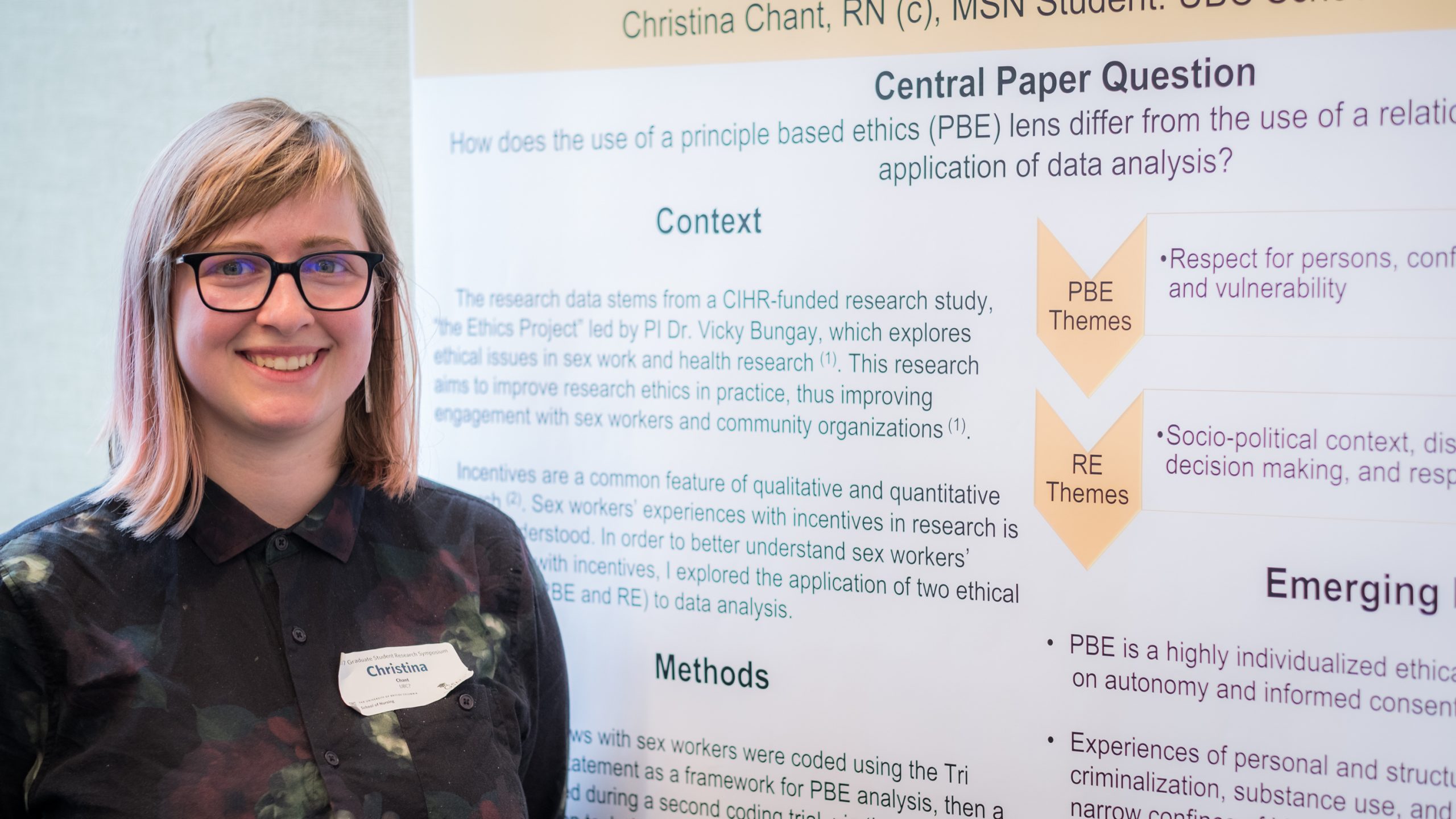Christina Chant
Interview with an MSN Student
You have been a primary care nurse for over 10 years. Why Nursing?
I grew up with a number of nurses in my life. So when it came to making a decision about what I wanted to study, I thought, why not try nursing? It was a bit of a gamble as I didn’t really know what nurses actually do. However, my experience in primary care nursing has been dynamic and engaging – I am constantly challenged and learning. Being present with people, and being allowed into their personal lives when they come to you with intimate needs is a privilege and has been very rewarding.
You are now working toward a master of science in nursing. What was your motivation for returning to school?
The opportunity to challenge myself and reflect on my practice was a huge component for deciding to return to school. In the last few years, I’ve been interested in research and improving my teaching skills. I also have had some excellent mentors along the way, especially Dr Vicky Bungay, who has kept me grounded and inspired from the get go!
Additionally, I have wanted to find ways to address health inequities from a structural/upstream place, rather than less effective individuated approaches. The MSN program has been a great place to explore and learn about potential strategies for changing health policy.
You have also been a clinical educator. What advice would you give to those wishing to follow that path?
I recommend folks find mentors and allies to help support and coach them through the nuances of teaching and facilitating. Many people underestimate the skills necessary to be a quality educator and leader. Having mentorship can facilitate growth and assist educators in empowering their nursing staff, save time in curriculum development by ‘borrowing shamelessly,’* and keep you afloat during tough times.
*always with permission ☺
What can you tell us about your fellowships? In what way have they helped advance your career?
I’ve been very privileged to have a graduate research fellowship with the Capacity Research Unit, working with Dr Vicky Bungay. The CRU is a research team focused on addressing health inequities in health and social services, particularly people engaged in the sex industry and people who use drugs. That experience was foundational for me in developing qualitative research skills. In terms of my career, having Vicky’s supervision has taught me a lot about leadership, critical thinking, coaching, and how to approach data in a way which centres the participant’s voice and remains true to your own values. These skills have been pivotal in developing my leadership capacity.
I also received the Dr Helen Preston Glass Fellowship from the Canadian Nurses Foundation. This fellowship has supported my research in examining how people engaged in sex worker experience research engagement, particularly ethical issues during data collection.
As a lot of my work has centered on working with people who have experienced significant marginalization, this work has provided space to centre voices which are generally silenced or ignored.
Your research interests lie in mental health and substance abuse, primary care, and HIV outreach. What drew you to these areas of study? How do these studies intersect, if at all?
My experiences supporting family through mental health and substance use services has heavily influenced my approach to nursing. Since I began my nursing career, I have been curious to understand the etiology of the conditions. What has become clear in my work and study, is the complexity of the conditions and their interrelationship with structural inequities closely tied to racism, trauma, and colonization. Thus, the opportunity to learn more and influence change in these areas has been my impetus to return to school.
When I started working in Clinical Education, the gaps in knowledge regarding mental health and substance use with health care providers became more evident. I wanted to learn more about ways to address this in a structural/organizational manner, and develop the skills necessary to do so.
Since starting my masters, I have contributed to the development of substance use education for nurses and undergraduate competencies in substance use nursing. Both projects are upstream strategies to change how nurses approach working with people who use drugs, with the longer-term goal of addressing culture change.
Can you suggest some basic practice changes that nurses could affect to promote health equity among those living with substance use issues?
Where do I start…
- Remember that people who use drugs are people first, the use of substances may or may not be a priority for them
- Truly practice patient centred care – ask people what they need, respect their wishes, don’t make assumptions about why they are accessing health care
- Practice self-reflection on the daily
- Come from a place of respect – Make eye contact, remember people’s names, come out from behind the glass and shake their hand, offer coffee and tea – simple things make a huge difference
- Practice evidence-informed care, not moral judgment
- Use your voice, learn more about drug policy, trauma, and the intersections with structural determinants of health. Advocate within your hospital and communities for improved access to health care services and treatment.
If you could effect a policy or legislative change today, what would you recommend, and why?
I would change our approach to drug policy. The war on drugs has been incredibly harmful and ineffective. I would recommend a public health approach to substance use regulation – based upon evidence, not judgment and moral bias. Through this approach, we could address the issue of contaminated drugs through controlling the drug supply, which is integral to addressing the overdose crisis. We need to stop punishing people for using substances and prioritize people’s humanity over fear.
Recommended Reading: Health Officers Council of BC November 2011, “Public Health Perspectives for Regulating Psychoactive Substances What we can do about alcohol, tobacco, and other drugs.” bit.ly/HOCBC
